GitHub Copilot frequently asked questions
This article answers frequently asked questions about using GitHub Copilot in Visual Studio Code.
GitHub Copilot subscription
How can I get a Copilot subscription?
There are different ways to get access to GitHub Copilot:
| Type of User | Description |
|---|---|
| Individual |
|
| Organization/Enterprise member |
|
How can I monitor my Copilot usage?
You can view the current Copilot usage in the Copilot status dashboard, available through the VS Code Status Bar. The dashboard shows the following information:
- Completions: The percentage of code completions quota you have used in the current month.
- Chat messages: The percentage of chat requests quota you have used in the current month.
- Premium requests: The percentage of premium requests quota you have used in the current month.
- Premium requests overage: The number of overage premium requests you have used in the current month.
Visit the GitHub Copilot documentation for more information about monitoring usage and entitlements.
I reached my completions or chat interactions limit
Your limit of code completions and chat interactions is reset every month, starting from the day you first signed up for the Copilot Free plan. If you reach your limit, you can opt to sign up for a paid subscription, and get an unlimited number of completions and chat messages. Alternatively, you can wait until the next month to continue using Copilot for free.
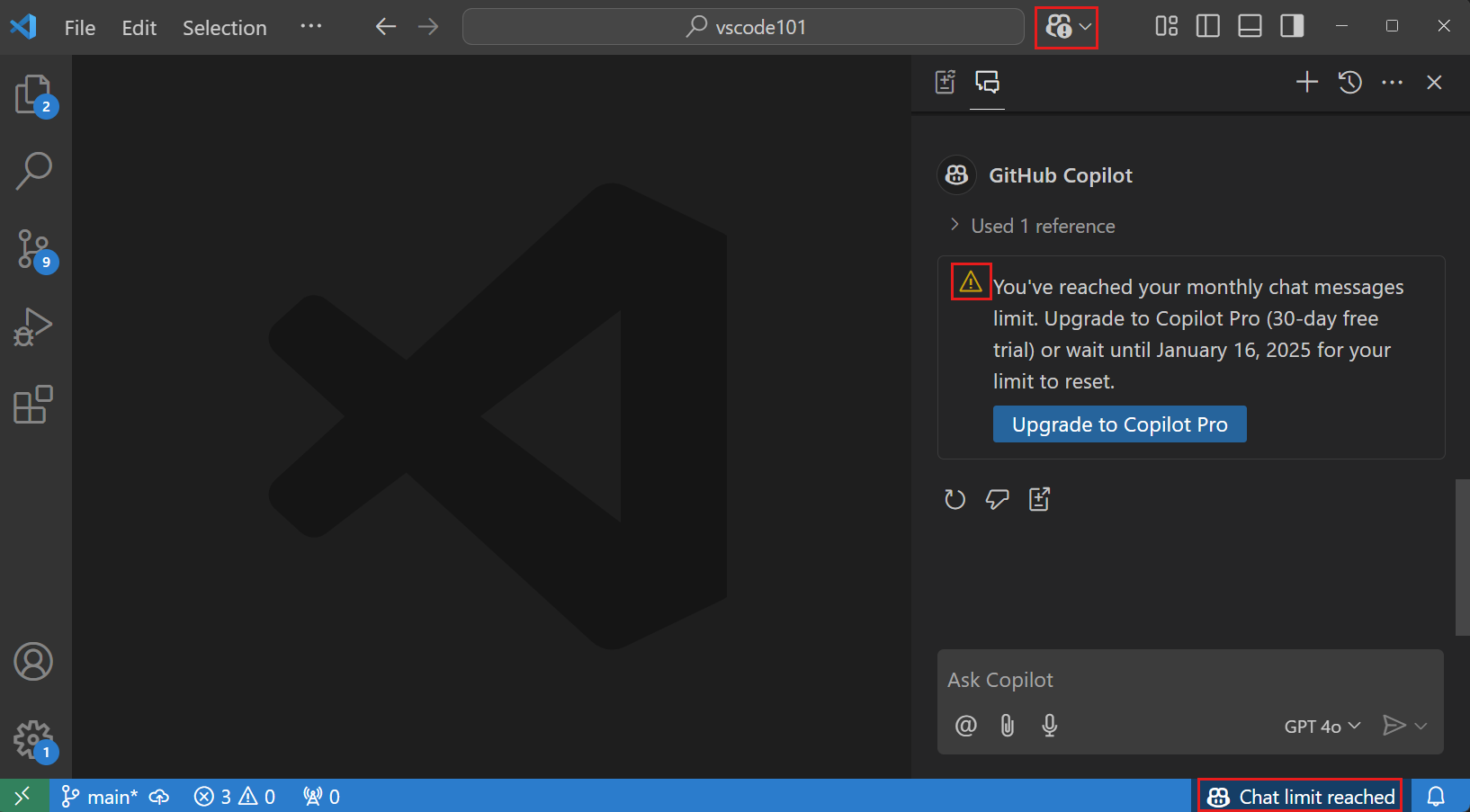
If only the chat interactions are reaching the limit, you can still use Copilot for code completions.
If only the code completions are reaching the limit, you can still use Copilot for chat interactions and Copilot Edits.
My Copilot subscription is not detected in VS Code
To use chat in Visual Studio Code, you must be signed into Visual Studio Code with a GitHub ID that has access to GitHub Copilot.
-
If your Copilot subscription is associated with another GitHub account, sign out of your GitHub account and sign in with another account. Use the Accounts menu in the Activity Bar for signing out of your current GitHub account. See Use a different GitHub account with Copilot for more information.
-
Verify that your Copilot subscription is still active in GitHub Copilot settings.
-
If you're using a Copilot plan for a managed user account on GHE.com, you'll need to update some settings before you sign in. See Using GitHub Copilot with an account on GHE.com.
How can I switch accounts for Copilot
If your Copilot subscription is associated with another GitHub account, sign out of your GitHub account in VS Code, and sign in with another account.
See Use a different GitHub account with Copilot for more information.
General
How can I remove Copilot from VS Code?
To remove Copilot from VS Code, select the Hide Copilot option from the Copilot menu in the VS Code title bar. This removes the Copilot menu from the title bar and the Status Bar, and removes the Chat view.
If you have already installed the Copilot extensions, you need to first uninstall the Copilot and Copilot Chat extensions from the Extensions view. After that, you can hide the Copilot menu.
To restore the Copilot functionality, run the Chat: Use AI Features with Copilot for free command from the Command Palette (⇧⌘P (Windows, Linux Ctrl+Shift+P)).
Network and firewall configuration for Copilot
-
If you or your organization employs security measures like a firewall or proxy server, it may be beneficial to include certain domain URLs in an "allowlist" and open specific ports and protocols. Learn more about troubleshooting firewall settings for GitHub Copilot.
-
If you're working on company equipment and connecting to a corporate network, you may be connecting to the Internet via a VPN or an HTTP proxy server. In some cases, these types of network setups may prevent GitHub Copilot from connecting to GitHub's server. Learn more about troubleshooting network errors for GitHub Copilot.
My request is rate-limited
This error suggests that you have exceeded the rate limit for Copilot requests. GitHub uses rate limits to ensure everyone has fair access to the Copilot service and to protect against abuse.
See Rate limits for GitHub Copilot for more information about rate limits and what to do if you are rate limited.
Are there pre-release builds of the Copilot extensions?
Yes, you can switch to the pre-release (nightly) version of a Copilot extension to try the latest features and fixes. From the Extensions view, right-click or select the gear icon to bring up the context menu, and then select Switch to Pre-Release Version:
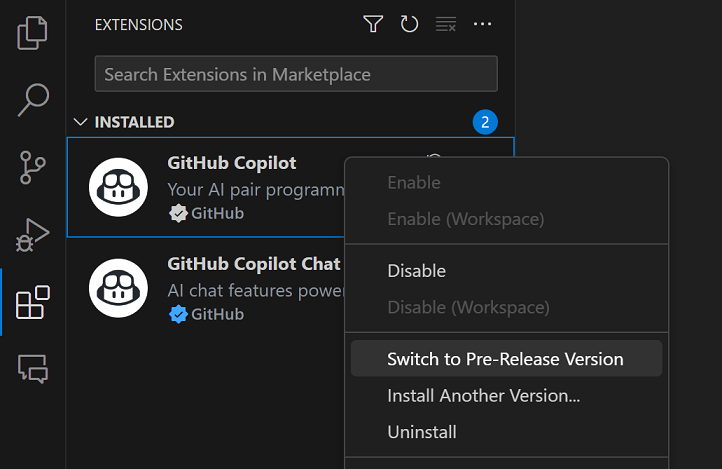
You can tell if you're running a pre-release version by the "Pre-release" badge in the extension details:

Code completions
How do I enable or disable code completions?
You can enable or disable code completions in VS Code by using the checkboxes in the Copilot status dashboard from the VS Code Status Bar. You can enable or disable code completions globally or for the file type of the active editor.
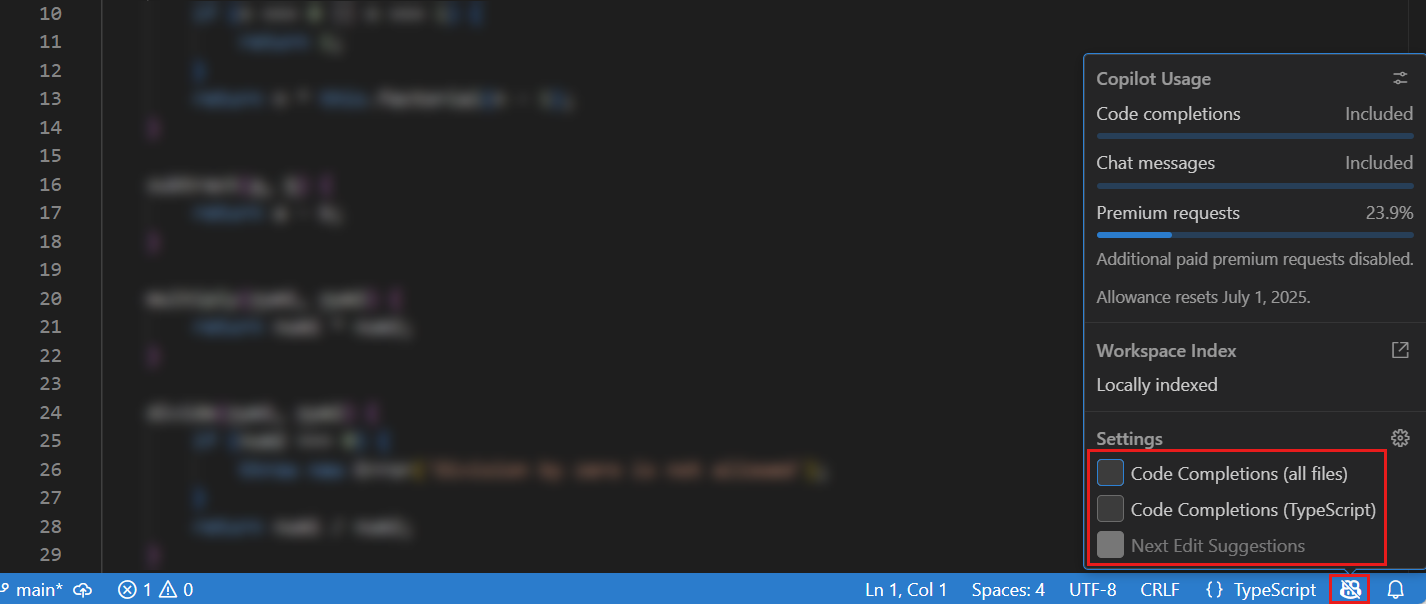
Inline completions are not working in the editor
- Verify that GitHub Copilot is not disabled globally or for this language
- Verify that your GitHub Copilot subscription is active and detected
- Verify that your network settings are configured to allow connectivity to GitHub Copilot.
- Verify that you have not reached the limit of completions for the month with the Copilot Free plan.
Chat
Chat features aren't working for me
Verify the following requirements to ensure Chat features work in Visual Studio Code:
- Make sure you are on the latest version of Visual Studio Code (run Code: Check for Updates).
- Make sure you have the latest version of both the GitHub Copilot and GitHub Copilot Chat extensions.
- Your GitHub account that is signed into VS Code must have an active Copilot subscription. Check your Copilot subscription.
- Verify that you have not reached your limit of chat interactions for the month with the Copilot Free plan.
Troubleshooting and feedback
How can I provide feedback on Copilot?
We track issues and feature requests for GitHub Copilot in VS Code in the microsoft/vscode GitHub repository. You can create issues in this repository or use the following feedback mechanisms in VS Code:
-
Code completions
Use the Send Copilot Completion Feedback action when hovering over a code completion in the editor. In the Issue Reporter, provide a clear and detailed description of the issue, including steps to reproduce it.

-
Next edit suggestions
Select the Feedback action in the next edit suggestions menu in the editor gutter. In the Issue Reporter, provide a clear and detailed description of the issue, including steps to reproduce it.
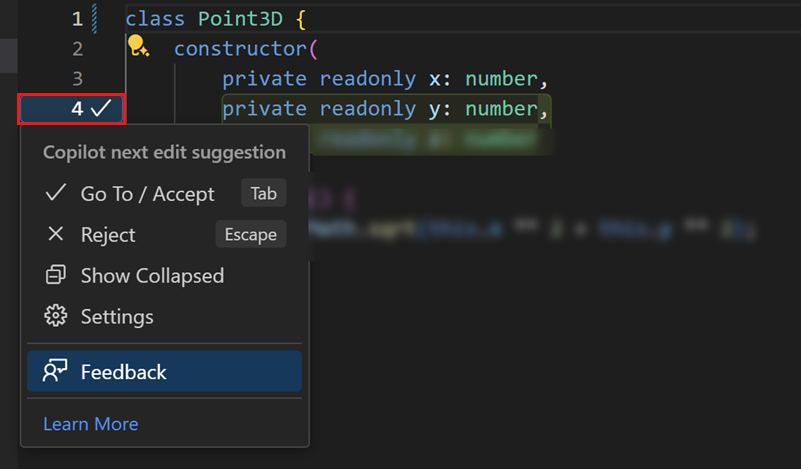
-
General issues
Open the VS Code Issue reporter (Help menu > Report Issue), select the VS Code Extension source, and then select the GitHub Copilot Chat extension. Provide a clear and detailed description of the issue, including steps to reproduce it.
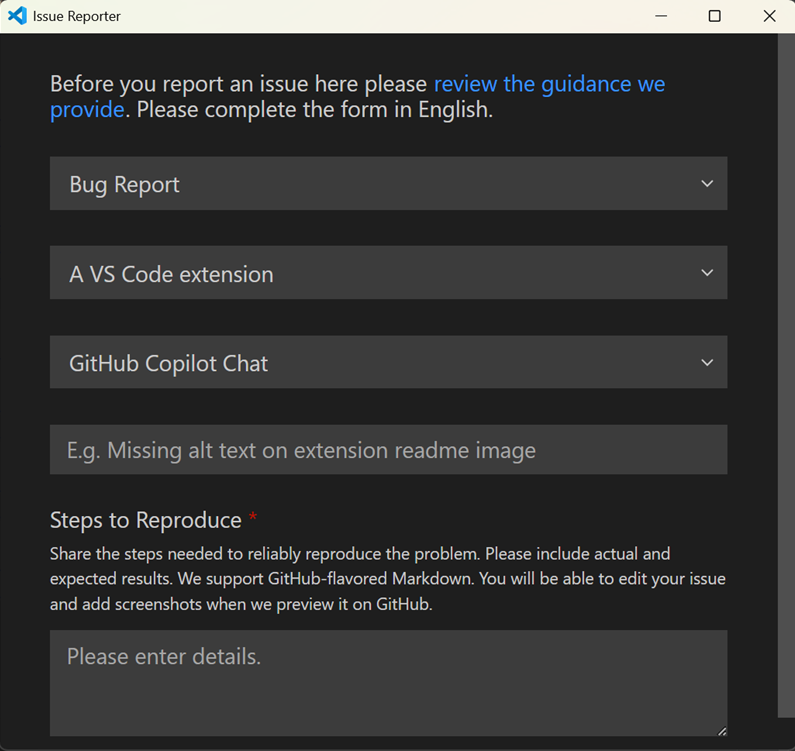
When you report an issue, follow the guidelines in our wiki to make sure your issue is actionable.
It can be helpful to include information from the GitHub Copilot logs if you're reporting an issue.
View logs for GitHub Copilot in VS Code
The log files for the GitHub Copilot extension are stored in the standard log location for Visual Studio Code extensions.
To get detailed logs for Copilot in VS Code, follow these steps:
- In the Command Palette (⇧⌘P (Windows, Linux Ctrl+Shift+P)), run the Developer: Set Log Level command and set the value to Trace (you can do this only for the GitHub Copilot and GitHub Copilot Chat extensions).
- In the Command Palette (⇧⌘P (Windows, Linux Ctrl+Shift+P)), run the Output: Show Output Channels command and select either GitHub Copilot or GitHub Copilot Chat from the list.
- In the Output panel, you can see the logs for the selected extension.
- To switch to another output channel, on the right of the Output panel, select GitHub Copilot or GitHub Copilot Chat from the dropdown menu.
If you encounter problems connecting to GitHub Copilot, you can view network connectivity diagnostics logs:
- Open the Command Palette (⇧⌘P (Windows, Linux Ctrl+Shift+P)).
- Run the GitHub Copilot: Collect Diagnostics command.
- An editor tab opens where you can inspect the diagnostics information.
Additional resources
- GitHub Copilot Trust Center
- GitHub Copilot FAQ in the GitHub documentation